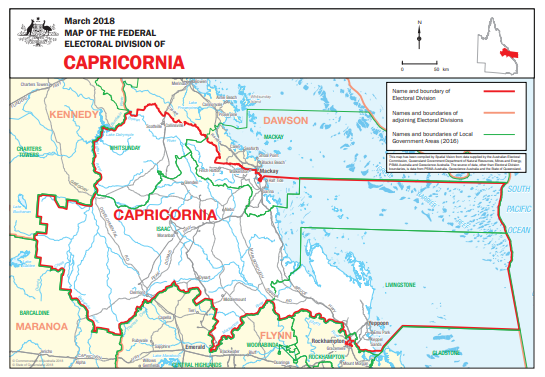|
|
|
|
| Adam Carr's Election Archive
|
Australian federal election, 2022
Division of Capricornia, Queensland
Named for: Regional name (the Tropic of Capricorn runs through Rockhampton) *
Central Queensland coast: Kawana, Moranbah, Rockhampton, Sarina, Yeppoon
State seats: All of
Keppell, parts of
Burdekin,
Mirani and
Rockhampton
Local government areas: All of
Isaac and
Livingstone, parts of
Mackay,
Rockhampton and
Whitsunday
Borders with:
Flynn,
Kennedy and
Maranoa
Enrolment at 2019 election: 102,577
Enrolment at 2022 election: 108,688 (+06.0)
1999 republic referendum: No 68.1
2018 same-sex marriage survey: Yes 54.1
Sitting member: Hon Michelle Landry (Nationals):
Elected 2013, 2016, 2019
2007 Labor majority over Liberal: 12.7%
2010 Labor majority over Liberal: 3.7%
2013 Nationals majority over Labor: 0.8%
2016 Nationals majority over Labor: 0.6%
2019 Nationals majority over Labor: 12.4%
Nationals two-party vote 1983-2019
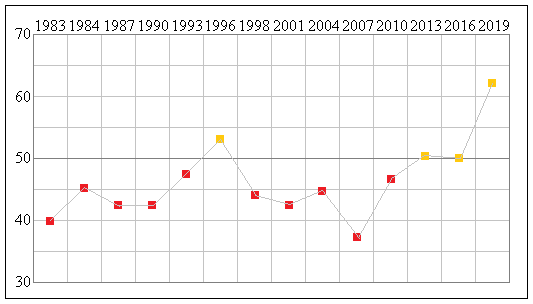
Status: Safe Nationals
Best Nationals booths, two-party vote: Clermont (81.6), Clermont PPVC (76.9), Chelona (76.7),
Carmila (75.9), Eton (74.0)
Best Labor booths, two-party vote: Collinsville (51.9), Berserker (51.4), Allenstown (47.5),
Moranbah Central (47.2), Rockhampton South (47.0)
2019 results
Statistics and history
Candidates in ballot-paper order:
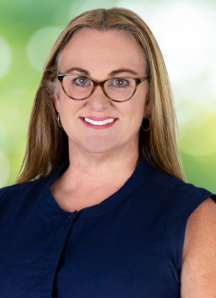 |
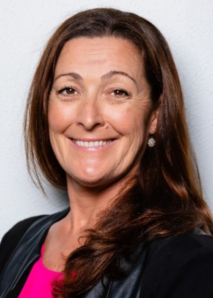 |
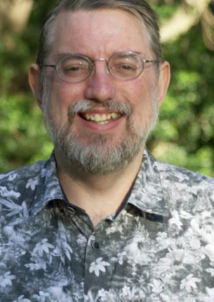 |
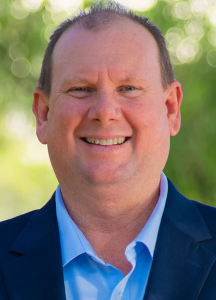 |
1. Kylee Stanton
Pauline Hanson's One Nation |
2. Paula Ganfield
Informed Medical Options |
3. Mick Jones
Australian Greens |
4. Russell Robertson
Australian Labor Party |
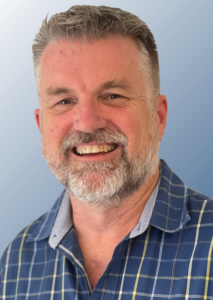 |
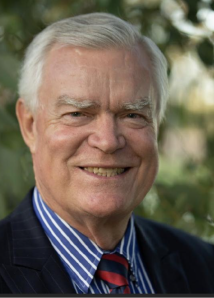 |
 |
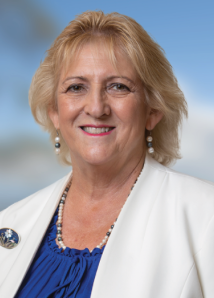 |
5. Steve Murphy
Liberal Democrats |
6. Ken Murray
Independent |
7. Nathan Harding
United Australia Party |
8. Hon Michelle Landry
The Nationals |
Candidate websites:
Paula Ganfield
Nathan Harding
Mick Jones
Michelle Landry
Ken Murray
Steve Murphy
Russell Robertson
Kylee Stanton
Division of Capricornia
Capricornia has existed since Federation, and has always been based on the provincial port of Rockhampton, although its boundaries have
fluctuated greatly at successive redistributions. Until recently it was usually been a Labor seat. The seat has rather higher median income levels than
most regional seats, but has the usual regional characteristics of low levels of people in professional occupations and of people born in non
English speaking countries.
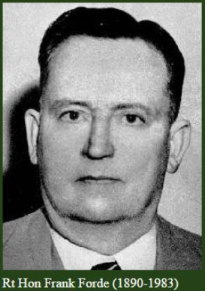 Like many other provincial cities, particuarly those based on resources industries, Rockhampton has turned against Labor in recent years, at least
at federal level. In 2013 Labor won most of the Rockhampton booths, some with more than 60% of the two-party vote, but by 2019 the Nationals were
winning most of them. The Nationals also sweep the small rural booths and the coastal towns of Sarina and Yeppoon.
Like many other provincial cities, particuarly those based on resources industries, Rockhampton has turned against Labor in recent years, at least
at federal level. In 2013 Labor won most of the Rockhampton booths, some with more than 60% of the two-party vote, but by 2019 the Nationals were
winning most of them. The Nationals also sweep the small rural booths and the coastal towns of Sarina and Yeppoon.
Capricornia's most distinguished member has been
Frank Forde, Labor's Deputy Leader 1935-46 and briefly Prime Minister in 1945. After his
defeat in 1946, Labor did not regain the seat until 1961. The Nationals won it in 1975 and 1996, in each case for only one term. But since
regaining it in 2013 the Nationals have tightened their grip on the seat. Labor's
Kirsten Livermore won Capricornia in 1998, and held it as a
backbencher until her retirement in 2013, when it fell to the Nationals on a 4.5% swing.
Michelle Landry, Nationals MP for Capricornia since 2013, was a bank officer for over 20 years before establishing her own book-keeping
business. She contested Capricornia in 2010 before winning it in 2013. She held the seat with only a slight negative swing in 2016. She gained a huge
swing in 2019 and now appears to be entrenched in the seat. In 2018 she was appointed an assistant minister. She is now Assistant Minister for Regional Tourism
and Assistant Minister for Children and Families. Labor's candidate is again Russell Robertson, a miner and CFMEU official from Moranbah.
The Greens candidate is Mick Jones, whose occupation is not stated.
* The first use of "Capricornia" as a regional name I have found is in article by Sir Thomas Mitchell in 1851.
Demographics:
Median weekly household income: $1,418 (Australia $1,438)
People over 65: 14.1% (Australia 15.8%)
Indigenous: 5.3% (Australia 2.8%)
Australian born: 80.8% (Australia 66.7%)
Non-English-speaking households: 5.9% (Australia 22.2%)
Catholics 26.6% (Australia 22.6%)
No religion 22.6% (Australia 29.6%)
University graduates: 11.3% (Australia 22.0%)
Professional and managerial employment: 25.2% (Australia 35.2%)
Employed in manufacturing and construction: 18.8% (Australia 22.9%)
Employed in agriculture: 5.9% (Australia 3.3%)
Paying a mortgage: 33.1% (Australia 34.5%)
Renting: 33.4% (Australia 30.9%)
Traditional families: 31.6% (Australia 32.8%)
Back to main page
|
|
 Like many other provincial cities, particuarly those based on resources industries, Rockhampton has turned against Labor in recent years, at least
at federal level. In 2013 Labor won most of the Rockhampton booths, some with more than 60% of the two-party vote, but by 2019 the Nationals were
winning most of them. The Nationals also sweep the small rural booths and the coastal towns of Sarina and Yeppoon.
Like many other provincial cities, particuarly those based on resources industries, Rockhampton has turned against Labor in recent years, at least
at federal level. In 2013 Labor won most of the Rockhampton booths, some with more than 60% of the two-party vote, but by 2019 the Nationals were
winning most of them. The Nationals also sweep the small rural booths and the coastal towns of Sarina and Yeppoon.
